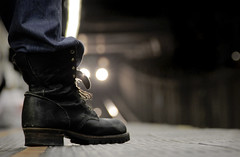The CEO and the Fry Cook: A Tale of Two McDonald's

Leslie Patton of Bloomberg Businessweek contrasts the lifestyles of the CEO of McDonald’s and a McDonald’s worker to illustrate how inequality has accelerated during the economic recovery.
Tyree Johnson, a 20-year veteran of McDonald’s, is holding down jobs at two Chicago locations. The 44-year-old fry cook earns the state minimum wage of $8.25/hr, and his two McDonald’s jobs give him fewer than 40 hours a week combined. He struggles to keep a roof over his head:
Tyree Johnson scrubs himself with a bar of soap in a McDonald’s (MCD) bathroom and puts on fresh deodorant. He stashes his toiletries in a Kenneth Cole bag, a gift from his mother who works the counter at Macy’s, and hops on an El train. His destination: another McDonald’s.
Johnson isn’t one of Chicago’s many homeless people who seek shelter in fast-food joints. He’s a McDonald’s employee, at both stores – one in the Loop, the other about a mile away in the shadow of Holy Name Cathedral.
He needs the makeshift baths because hygiene and appearance are part of his annual compensation reviews. Even with frequent scrubbings, he said before a recent shift, it’s hard to remove the essence of the greasy food he works around.
“I hate when my boss tells me she won’t give me a raise because she can smell me,” he said. [Bloomberg]
McDonald’s new CEO, Don Thompson, joined the company in the early nineties, about the same time as Tyree Johnson. Twenty years ago, the CEO’s salary was 230 times times more than minimum wage. Thompson’s immediate predecessor earned 580 times minimum wage.
In addition to a generous salary, Thompson enjoys such lavish perks as the use of a corporate jet. Johnson gets free food at one of his McDonald’s jobs, but only if he eats it in the break room, where customers can’t see him, if he gets caught eating in the lobby he’ll be fired.
[Photo credit: Keoni Cabral, Creative Commons.]











